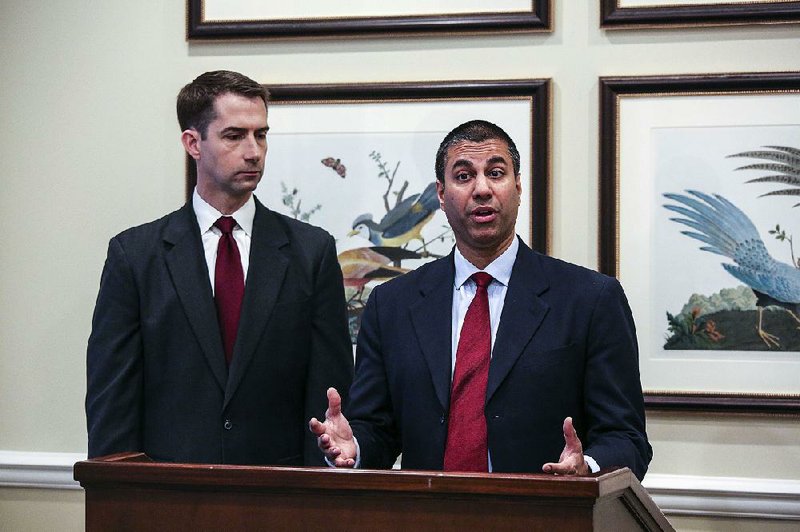WASHINGTON -- Sinclair Broadcasting's proposed $3.9 billion acquisition of Tribune Media has raised "serious concerns" at the Federal Communications Commission about the amount of control the combined company would have over the U.S. television market, said Ajit Pai, the agency's chairman.
Pai said Monday that he intends to send key parts of the deal to review by an administrative law judge, which is typically the first step the FCC takes when it seeks to block a deal.
The merger would consolidate Sinclair's position as a major conservative broadcasting entity, adding dozens of media stations to its roster. Its original merger proposal, if approved, would have given Sinclair access to 72 percent of television households in America, far surpassing a national ownership cap of 39 percent.
Sinclair had proposed spinning off a number of stations to get beneath the cap. But a number of the new, prospective owners had close ties to Sinclair executives, which critics said would allow Sinclair to stay in control of the stations it sold.
Pai said Monday he found those arguments persuasive.
"The evidence we've received," said Pai, "suggests that certain station divestitures that have been proposed to the FCC would allow Sinclair to control those stations in practice, even if not in name, in violation of the law."
Pai said he had asked his three fellow commissioners to vote to send the deal to a hearing. Two quickly did so, giving Pai's proposal a majority.
The deal is also being examined by antitrust regulators at the Justice Department.
Sinclair, which grew from a single TV station in Baltimore in 1971, is the largest owner of TV stations in the United States, with 192. The Maryland company announced in May 2017 that it planned to acquire Tribune Media's 42 TV stations in 33 markets.
Sinclair owns Little Rock's KATV, an ABC affiliate.
Under Sinclair's plan, flagship Tribune station WGN in Chicago would go to a car dealer who is a business associate of a top Sinclair executive, while outlets in Dallas and Houston would be sold to a company formerly controlled by the estate of the executive's mother. Seven stations would go to 21st Century Fox Inc.
Pai, in his order, mentions possible misrepresentations or lack of candor by Sinclair regarding its proposed WGN sale, said an FCC official who spoke on condition of anonymity because the document is not yet public.
The order also questions ties between Sinclair and the proposed buyer of the Texas station, the official said.
Pai's move was a setback for Sinclair, a politically conservative broadcaster that's seen as friendly to President Donald Trump. He has praised the company on Twitter, saying it's superior to AT&T Inc.'s CNN and Comcast Corp.'s NBC. Pai, too, has been accused of favoring Sinclair. The FCC's inspector general is said to be investigating whether Pai improperly pushed for rule changes that helped clear the way for Sinclair's Tribune bid, an allegation Pai denies.
Commissioner Jessica Rosenworcel, the agency's sole Democrat, said she voted to send the merger to a hearing. "Too many of this agency's media policies have been custom built to support the business plans of Sinclair Broadcasting," Rosenworcel said in an email statement. Brendan Carr, a Republican FCC member, likewise voted yes, said an FCC official who spoke on condition of anonymity because the tally hadn't been made public.
Sinclair's executive vice president, Barry Faber, didn't return an email and telephone call seeking comment. Gary Weitman, a Tribune spokesman, declined to comment.
Sinclair has said the station buyers are independent businesses, and that it's working diligently to follow the rules.
Just the threat of an FCC hearing, which can take months, can be fatal to a deal. In 2011, AT&T Inc. abandoned its proposed purchase of smaller T-Mobile US Inc. after the FCC proposed to send the merger to an agency judge for a hearing. The same move by the FCC in 2002 helped block EchoStar Communications Corp.'s acquisition of satellite-TV rival DirecTV.
"This delay may prove to be too much for Sinclair," Paul Sweeney, a Bloomberg Intelligence analyst, said in an email. "Historically, Sinclair has been very successful pushing the edge of the envelope with the FCC. In this case, it looks like the FCC is prepared to shove back."
Deal critics lauded Pai's move and said it could kill the merger proposed in May 2017.
"Republicans, Democrats and those that are concerned about the concentration of media power should join me in commending Chairman Pai," Christopher Ruddy, chief executive officer of Sinclair competitor Newsmax Media Inc., said in an emailed statement.
"Designating a transaction for a hearing is the FCC's first step toward denying the deal," Matt Wood, policy director for the policy group Free Press, said in an emailed statement.
The Trump administration also sought to block AT&T's acquisition of Time Warner Inc. Although a judge allowed that deal to proceed, the Justice Department said last week that it would seek an appeal of the decision.
Information for this article was contributed by Brian Fung of The Washington Post, by Stephen Battaglio of the Los Angeles Times, and by Todd Shields of Bloomberg News.
Business on 07/17/2018

